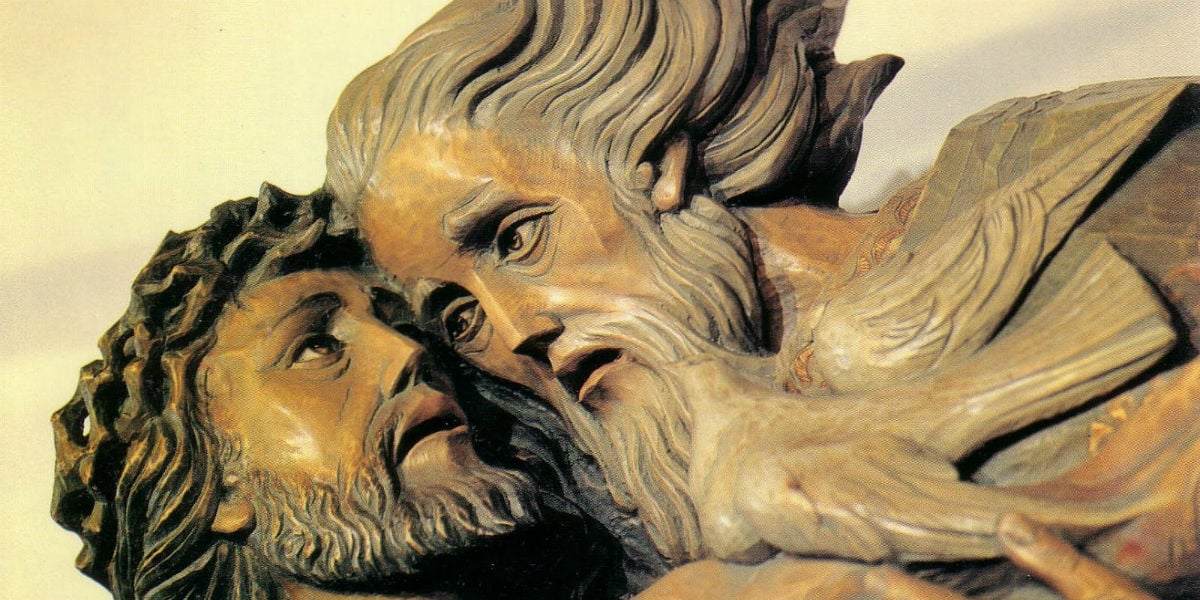Pope Leo XIV – Inaugural Mass Homily
Elected on May 8, 2025, as the 267th successor of St. Peter, Pope Leo XIV’...

This post is also available in: Spanish, Italian
The Fatherhood of God has come under fire with the rise of feminism. If we know that God is pure spirit who transcends male and female, masculine and feminine, why preserve what some believe to be the antiquated, patriarchal practice of referring to the divinity as “Father”? This article uses the occasion of the American observance of Father’s Day to examine what it means to call God “father.” To LISTEN to this father’s day post read by Dr. Italy, click on the play arrow on the left directly below this paragraph.
Father’s Day invites us to ask a very important question – what does it mean to call God “Father?”
Most of the great religions of the world believe in one God and teach the gist of the Ten Commandments.
But that the supreme Being is not just “King of the Universe” or “Master” but “Father,” that he desires that we have a close, familiar relationship with Him–these ideas you don’t find anywhere outside the teaching of Jesus.
To call God “Father” does not mean to say, of course, that he is an old man with a white beard. Only the second person of the Blessed Trinity wedded himself to a male human nature in the womb of Mary. The Father and the Holy Spirit are pure Spirit and transcend male and female, masculine and feminine (CCC 239).
This is no new insight brought to Christianity by the feminist movement. It has always been taught that the word “Father” applied to God, is used by way of analogy. Analogies tell us something very true despite being imperfect. Until recently, the father was recognized by Western society as origin, head and provider of the family. To call the first person of the Trinity “Father” means that he is the origin and transcendent authority of all and cares for the needs of all.
But we all instinctively know that a father who just pays the bills and barks orders is not enough. We expect a dad to have an intimate, affectionate relationship with his children, to spend “quality time” with them. To call God “Father” means, then, that he is near to us, intimately concerned with us, fond of us, even crazy about us. He is not the distant, clockmaker God of Thomas Jefferson and the Deists. This aloof God of the philosophers created the world to run by virtue of its own natural laws so that he could withdraw and occupy himself with more interesting pursuits.
No, the God whom Jesus calls Father cares about us and knows us intimately. “Every hair on your head is numbered (Matthew 10:30).” He loves us more than we love ourselves and knows us better than we know ourselves.
Now, this does not mean that He makes all things go smoothly for us. He loves us so much that He made us in His image and likeness, which means He made us free. And through the free choice of the first man and woman, evil and death were invited into our world.
God does not shield us from all the troublesome consequences of this “original sin” which each of us, sadly, has ratified with our own personal sin. But He sent us prophets, like Jeremiah, to wake us up and warn us of the horrible consequences of disobedience. And finally He sent his firstborn Son to be a new Adam, to pay the price of that disobedience and give the human race an undeserved new start.
The most horrible consequence of sin, eternal death (Gehenna), has been graciously removed for all who accept the free gift of salvation that comes by way of the cross of Christ. But evil is still at large in the world, and evil brings trials and tribulations.
Our Father will not shelter us from these anymore than He sheltered Jeremiah (Jer. 20:10-13) or Jesus. A good father doesn’t protect his children forever from the harsh realities of life, but helps them as they progress through various stages of development to face the challenges and grow through the difficulties. Scripture says that even Jesus learned obedience through what he suffered (Heb. 5:8-9). How much more do we need to learn and mature, and some learning can only take place through suffering.
So as a true Father, he loves us too much to take us out of the fray. But there’s one thing we can be sure of–He’ll never leave us to fight our battles alone.
For a podcast by Dr. Italy on the fatherhood of God, listen to WHY WE CALL GOD FATHER.
This article on the fatherhood of God is offered as a reflection upon the readings for the Twelfth (12th) Sunday in Ordinary Time, liturgical cycle A (Jeremiah 20:10-13, Psalm 69, Romans 5:12-15; Matthew 10:26-33), and also for the secular observance of Father’s Day in the USA, which usually occurs on or near the 12th Sunday of Ordinary Time.
Banner/featured image of Jesus comforted by God the Father. Artist unknown. Public domain.
Sarah T M Bell
Posted at 11:16h, 21 JuneFor the last couple of editions the content of the pages – the important content judders and I can barely read the text. Is this something to do with you or me? It only happens with your site – nobody else’s. . .
Roberto Reyna Orozco
Posted at 14:43h, 21 JuneBeautifully said! thank you!
Marcellino D'Ambrosio
Posted at 16:54h, 24 JuneSarah, this happens only when people use Chrome and have the zoom set to something other than 100%. Just set your zoom to 100% and you’ll see it fine! Sorry for the inconvenience, but it is a Chrome specific problem that our programmers have been unable to fix on our end.